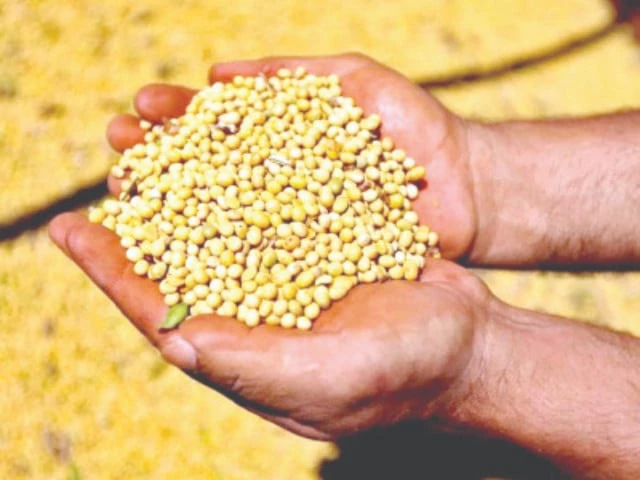GMO soybean revives feed industry
Experts affirm no health risks as output recovers, export opportunities expand

After the approval of genetically modified organism (GMO) soybean imports a month ago, the feed industry's output has rebounded to around 7 million metric tonnes (MMTs) and is expected to reach 9 MMTs soon, feed experts and agriculturalists have said. They stressed that there are no health risks associated with GMO seeds or their by-products for humans or animals.
They said the feed industry's output had declined significantly in recent months, dropping from an annual high of 8.59 MMTs to just 4.55.9 MMTs. This sharp reduction underscored Pakistan's heavy reliance on imported GMO products.
After a three-year suspension, GMO soybeans are set to re-enter the Pakistani market. The industry is now preparing to resume large-scale crushing operations, with plans to process over 2MMTs of soybeans and more than 1MMTs of canola and sunflower seeds annually. This expansion is expected to reinvigorate industry growth, enhance local production, and strengthen regional trade.
Soybeans offer a diverse range of by-products, including soybean oil, meal, textured protein (meat alternative), soy milk, tofu (bean curd/yogurt), and more.
Pakistan's solvent extraction and feed industries are deeply interconnected, primarily due to the lack of advanced value-addition and fractionation processes for soybeans. Once oil is extracted, the remaining by-products are primarily used in animal feed, directly linking both industries and influencing economic stability and food security.
In recent years, this dependency has posed significant challenges. The restriction on GMO soybean imports severely impacted feed efficiency, causing ripple effects throughout the agriculture and food sectors. The poultry industry, in particular, suffered greatly due to the lack of affordable, high-protein soybean meal. As a result, poultry production nearly halved, as feed producers were forced to replace GMO soy with costly non-GMO alternatives. Additionally, the canola market is limited due to obstacles in meal consumption, discouraging its processing.
Agriculturalist and feed expert Dr Muhammad Arshad, who is also Chief Executive Officer of Hi-Tech Group of Companies, said, "Following the approval of GMO soybean imports a month ago, output has since recovered and reached around 7MMTs and is due to touch 9MMTs soon."
Addressing concerns over GMO soybeans, Arshad said, "There are no health hazards associated with GMO seeds or their by-products for both humans and animals." He stated that for nearly four decades, the most developed nations have widely consumed GMO products, citing global figures: the United States produces 125140MMTs of GMO soybeans annually, Brazil produces approximately 170MMTs, and Argentina processes 50MMTs. These countries consume a significant portion domestically and export the remaining tonnage mainly to China and the rest of the world, including the European Union (EU). Moreover, Western Europe consumes 2025MMTs. He said misconceptions about GMO soybeans in Pakistan are unfounded and not supported by health advisories.
He noted that the return of GMO soybean processing could open doors for Pakistan in the highly competitive meal export market. Neighbouring countries like Thailand, Vietnam, and Malaysia, as well as Gulf nations such as the United Arab Emirates, Qatar, and Oman, are viable markets for these products.
Pakistan's strategic location, including its access to China through the China-Pakistan Economic Corridor (CPEC), offers significant logistical advantages. By tapping into the demand from Central Asia, Afghanistan, and southern Chinese provinces, Pakistan could position itself as a regional supplier of soybean meal and related by-products. Products and by-products from GMO canola and sunflower seeds also have export potential, adding another layer of opportunity for Pakistani exporters. While the higher costs of utilities in Pakistan may be a minor drawback in these international markets, favourable exchange rates could help offset these expenses, enhancing the competitiveness of Pakistani exports.
The issuance of new import permits is already showing positive effects on the local market. Indicators suggest that the poultry industry, which had been on the decline, is beginning to stabilise. Noted agriculturalist Nabi Bux Sathio stressed the need for strict standard operating procedures (SOPs) and vigilance over imported GMO soybeans and seeds to ensure their full efficacy.
He said, "Importers generally lift discarded produce and products to sell them at higher rates in the local market. The government must monitor the shipments thoroughly and properly."
He added that the government must focus on producing high-quality indigenous seed varieties to reduce the import bill on commodities. "It is really a matter of concern that the country's crop yields are continuously falling despite ample use of pesticides," he said.



















COMMENTS
Comments are moderated and generally will be posted if they are on-topic and not abusive.
For more information, please see our Comments FAQ